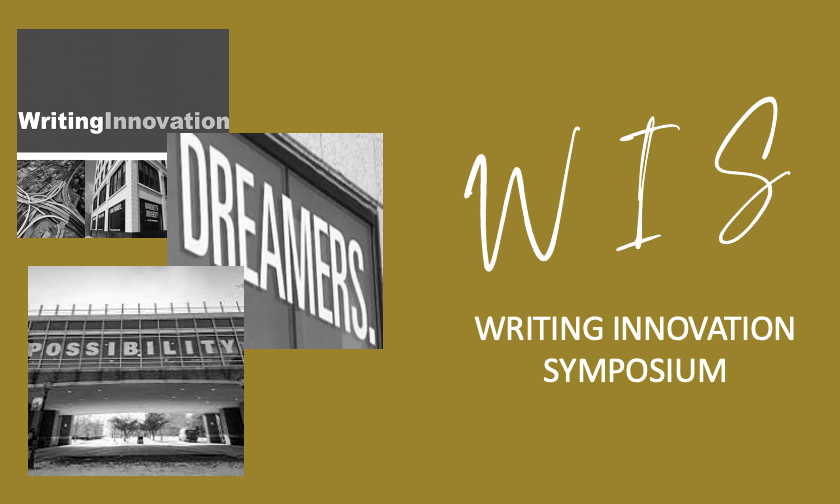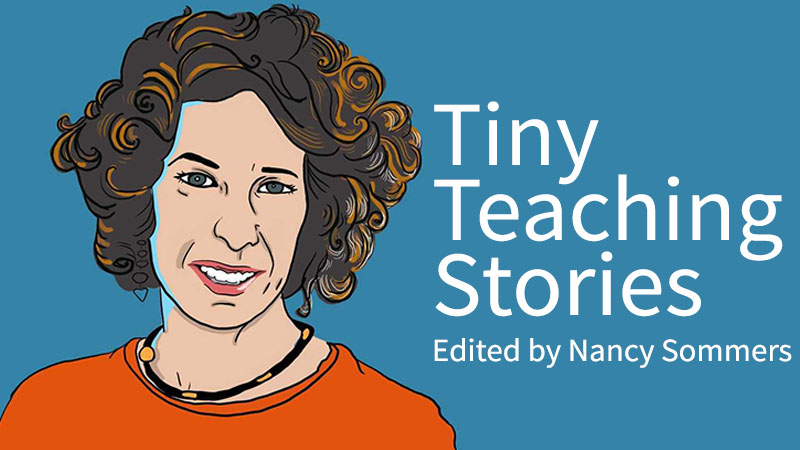-
About
Our Story
back- Our Mission
- Our Leadershio
- Accessibility
- Careers
- Diversity, Equity, Inclusion
- Learning Science
- Sustainability
Our Solutions
back
-
Community
Community
back- Newsroom
- Webinars on Demand
- Digital Community
- The Institute at Macmillan Learning
- English Community
- Psychology Community
- History Community
- Communication Community
- College Success Community
- Economics Community
- Institutional Solutions Community
- Nutrition Community
- Lab Solutions Community
- STEM Community
- Newsroom
- Macmillan Community
- :
- English Community
- :
- Bits Blog
- :
- Bits Blog - Page 2
Bits Blog - Page 2
Options
- Mark all as New
- Mark all as Read
- Float this item to the top
- Subscribe
- Bookmark
- Subscribe to RSS Feed
Bits Blog - Page 2
Showing articles with label Events and Conferences.
Show all articles
Expert
10-25-2024
03:45 PM
by Darci Thoune and Jenn Fishman Since the inaugural (WIS) in 2018, folks have been telling us that ours is an event where they feel seen, heard, and valued or, in a word, welcome. As Kaia Simon recalls in Community Literacy Journal, describing her experience at our first WIS: “It was my first year out of graduate school,” and “I remember feeling truly like a guest, likeI had been invited and that my presence mattered.” Comments like these are important to any event organizers, but all of us involved in the WIS couldn’t be more proud because of the priority we place on hosting. In fact, it’s a central part of the WIS mission, and we’ve worked hard to make it one of our hallmarks. In fact, when we started planning WIS ‘22, our first gathering of the COVID era, the importance of hosting was very much on our minds. After a year’s hiatus, we wanted to do more than simply reinstate the WIS. We wanted to amplify our hospitality, although we weren’t sure how. Enter our colleagues from Macmillan Learning. Thanks to Laura Davidson and Joy Fisher Williams, we were able to level up as hosts beyond our original capacity or our initial imaginings. Through our partnership with them, in 2022 we launched the Bedford/St. Martin’s WIS Fellows Program. It offers 3-5 early career colleagues mentorship and need-based financial support to attend the symposium as well as an opportunity to publish here on the Bits Blog. Over 3 years, the program has grown and grown, and in 2024, we welcomed our first international cohort of B/SM WIS Fellows. The roster includes: Abigayle Farrier, a lecturer in the English Department at the University of North Texas, who delivered the flashtalk, "Who Let the Dog Out?: Therapy Dogs and Trauma-Informed Pedagogy," and shared a poster, "Collaging Humans: Reflecting on the Writing Process." Christina Davidson, a PhD student in Rhetoric and Composition and Assistant Director of Composition at the University of Louisville, who shared her workshop "Collaborative Writing with AI: Utilizing Design Thinking to Improve Classroom Outcomes." Emma Tam, a writer, interdisciplinary educator, and senior undergraduate at Minerva University, who joined the WIS from the UK as an online participant. Saurabh Anand, a PhD student in Rhetoric and Composition and Assistant Writing Center Director at the University of Georgia, who presented his poster "My Queer Heart." Sonakshi Srivastava, a writing tutor at Ashoka University, Sonepat, India, who shared her WIS poster, "What's Attention Got To Do With It: On Reading and Notemaking as Writing Pedagogy," this was also the topic of her 2024 Watson Conference project. This group attended WIS ‘24, Writing Human/s, both onsite and online, and they made vital contributions as writers, as writing scholars and teachers, and as colleagues. Highlights include the synergy that developed between them and their mentors, all members of the 2024 WIS Steering Committee, including Gitte Frandsen, Jenna Green, Max Gray, Patrick Thomas, and Seán McCarthy. Today, the Macmillan-WIS partnership is one of the brightest spots in the WIS sky. You’ll see what we mean via forthcoming posts by 2024 Fellows Christina Davidson, Saurabh Anand, and Sonakshi Srivastava. We also invite you to follow the tags for WIS and writing innovation, where you’ll find additional insights from past B/SM WIS Fellows and others. Early career colleagues—undergraduates, graduate students, recent graduates, and others who have recently joined the profession—will find information about the latest fellowship opportunities in the WIS ‘25 CFP. In all, we hope the B/SM WIS Fellowship is a beacon that shines alongside WIS program opportunities, which include workshops, posters, small-scale performances and displays, and large-scale installations as well as flashtalks, flares, and sparks. The theme for WIS ‘25 is mise en place, a culinary term for putting things in place before cooking, especially in a professional kitchen. For us, it’s a metaphor for getting ready to write as well as a pathway to exploring the interrelationship between writing and food. Join us online or in Milwaukee, WI, January 30-31, 2025. Proposals are welcome through 10/25 and, for undergraduate writers, through 12/13. Registration opens in early November.
... View more
Labels
-
Composition
-
Events and Conferences
0
1
948
Expert
10-18-2024
12:00 PM
by Jenn Fishman This is the first post in an occasional series affiliated with the Writing Innovation Symposium (WIS), a regional event with national reach that Jenn leads as Chief Capacitator. Learn more below and in posts tagged “writing innovation” and “WIS.” OpenAI went public with ChatGPT not even two years ago on November 30, 2022. It’s worth pausing to think about how we, as writers and writing educators, have been affected. For old times’ sake, find a pen or a pencil and a piece of paper, and make a list. Don’t stop to correct yourself or sort the positives from the negatives. Just tell yourself all the ways that AI and GenAI have had an impact on you. Some version of this exercise might be a good question of the day or freewriting topic. It makes me think about how quickly Facebook spread twenty years ago, extending from Harvard to Columbia, Stanford, and Yale in 2004; to other colleges, universities, and high schools in 2005; and to anyone with an email address and access to the internet by the end of the next year. I was a graduate student when Facebook launched, and two years later, while I was navigating the changing face of writing and writing instruction as an assistant professor, Facebook registered its 12 millionth user. The velocity of writing change, both measured and felt, prompted the cross-institutional group of us involved in the Writing Innovation Symposium or WIS to make 2024 the year of “Writing Human/s.” For us, and perhaps for you too, writing is fundamental to our human being. So we practice it again and again, and we build lives around it. We have favorite writing tools, spaces, and snacks, and if we are lucky we have writing groups that sustain us. There is writing that stays with us, writing we feel compelled to write, and writers it is our privilege to advise, mentor, and teach. To echo Donald Murray (with a dash of Elizabeth Bishop), writers write or (say it!) writers must write, and students and teachers of writing must write, too. With a sense of imperative as well as a sense of play, we gathered online and in Milwaukee, Wisconsin, at Marquette University in the first days of February to affirm, explore, question, and contend with the complexity of being writing human/s in the mid-2020s. The WIS program featured workshops about AI and collaborative writing, autoethnography, mail art, and post-ChatGPT assignment design as well as shimmer stories, the social stakes of peer response, teaching in times of crisis, and ‘zines as sites of radical possibility. We also offered a series of 5-minute flashtalks on topics as varied as robot peer review, climate change, critical making, and the embodiment of emotions, problems, and solutions in writing classrooms. In addition, along with research posters and displays, WIS ‘24 featured more than two dozen flares or 3-minute audio- and video-recorded thinkpieces by undergraduates. The opening workshop, “Multimodal Writing, Drawing, and Listening” led by Tracey Bullington set the scene. Tracey joined us from the doctoral program in Curriculum and Instruction at the University of Wisconsin, Madison. At WIS, she began with a simple lesson. Observing it is difficult, if not impossible, to learn something if we believe we cannot do it, Tracey led us in a series of drawing exercises inspired, in part, by her teacher, Lynda Barry. Following Tracey’s instructions, we drew breakfast (bacon and eggs) without looking down at our index cards or felt-tipped pens. We drew self-portraits and pictures of ourselves as animals. Then, flush with evidence of our ability, we listened to one another tell stories, and (coached by Tracey) we drew our takeaways. The results were a combination of documentary-style notes, impressions, and embellishments that inscribed what and how we heard what others were saying. We were writing human/s, and we had the pictures to prove it! Our closing activities also featured the writing arts, starting with a spoken word performance by Donnie McClendon, a PhD student in English at the University of South Florida. Through “When 4 is 6,” Donnie taught a complex lesson about remembering and forgetting by telling the story of Johnny Robinson and Virgil Ware. They were murdered the same day in 1963 that the 16th Street Baptist Church in Birmingham, Alabama, was bombed, killing Addie Mae Collins, Denise McNair, Carole Robertson, and Cynthia Wesley. We listened to their story, and then, we ended the way we began: by drawing our takeaways along with our gratitude. In the same spirit, the blogs that follow offer a coda to WIS ‘24 as well as a bridge to WIS ‘25. We hope you’ll join us here on the Bits Blog and in Milwaukee next year. The theme for WIS ‘25 is mise en place, a culinary term for putting things in place before cooking, especially in a professional kitchen. For us, it’s a metaphor for getting ready to write as well as a pathway to exploring the interrelationship between writing and food. Join us online or in Milwaukee, WI, January 30-31, 2025. Proposals are welcome through 10/25 and, for undergraduate writers, through 12/13. Registration opens in early November.
... View more
Labels
-
Events and Conferences
0
1
776
Expert
10-13-2023
10:00 AM
by Jenn Fishman and Darci Thoune This is the first post in an occasional series affiliated with the Writing Innovation Symposium (WIS), a 2-day annual event hosted online and in Milwaukee, WI, by a group that includes Darci and Jenn. Learn more below and in posts tagged “writing innovation” and “symposium.” Five years is and isn’t a long time, especially in higher education. According to the National Center for Education Statistics, nearly 60% of college students finish their undergrad degrees in 5 years, while the Survey of Earned Doctorates reports the median time to PhD isn't much longer: just 5.8 years. For all of us involved in the annual Writing Innovation Symposium (WIS), 5 years turned out to be just enough time for us to realize that we were really on to something—and to start putting it into words. Since its founding in 2018, the WIS has been a regional event with national reach. Annually, in the dead of winter, the WIS lures writers and writing educators from all over North America to Marquette University in Milwaukee, WI, for two days of writing activity. As co-founder and Chief Capacitator, Jenn leads the cross-institutional steering committee that brings each symposium to life. In 2022-2023, that group was helmed by Darci, Jennifer Kontny, and Patrick Thomas; it also included Grant Gosizk, Jackielee Derks, Jenna Green, Kayla Urban Fettig, Kelsey Otero, Lilly Campbell, Maxwell Gray, Sara Heaser, Shevaun Watson, and Tara Baillargeon. Marquette University hosts the Writing Innovation Symposium When we look back and try to put a finger on what, exactly, makes the WIS the WIS, a few concrete details come immediately to mind, starting with our modest size. Usually, the WIS registers about 100. Participants come mainly from across academic ranks, roles, and disciplines, though non-ac colleagues tell us they feel right at home. The weather is also a contributing factor. Together, we have braved both ice and snowstorms as well as a polar vortex, which dropped the temperature to -23! Yet, it’s always warm and cozy in the University Libraries, where on-site we hunker down, while off-site attendees click in and out of Zoom sessions and Slack channels to join us. In so many ways, the WIS is Brigadoon, and for the 48 hours we gather each year, we form something that feels like community. In many ways, COVID-19 amplified this sense. The 2020 WIS was the last professional event many of us attended before the global pandemic was declared. Likewise, the 2022 WIS was the first in-person conference for a lot of us—and not just because it fit our budgets and schedules. Just as magnetic objects create force fields that attract particular elements (i.e., iron, nickel), the WIS draws writers and writing educators in a powerful way. By inviting everyone to base their contributions on work they have done—writing, writing pedagogy, research, writing administration—the WIS affirms the expertise that each participant brings with them. The WIS also primes attendees to learn from one another, and in doing so it affirms that everyone, from plenary presenters to the newest graduate teachers, has something to learn. Symposium themes help focus our collective energy. We have worked to “Connect!” (2019), and we’ve explored some of the many connotations of “Just Writing” (2020). We’ve also come together to “Write It Out” (2022) and to fill in the blank: “Writing as _____” (2023). However, we direct our word play along with our most serious efforts, our plenaries are interactive, and our programs always include workshops as well as a session that features posters and creative, digital and analogue displays. Last year, we introduced flash talks into the mix, inviting presenters to distill their WISdom into five-minute presentations accompanied by a single artifact (e.g., handout, bookmark, cookie). Inaugural examples prompted rich exchanges about everything from “Writing in Times of Hopelessness” and “Writing as Empathic Design” to “Composing in the Pool,” “Reinventing the Writer’s Workshop,” “Writing as Resistance,” and “Writing as Power,” and “Writing as Weapon/Antidote.” The story of WIS continues to be written. Recently, twenty-nine of us talked about an article that appears in Community Literacy Journal 17.2, and we’re glad to be contributing to Bedford Bits. Macmillan has been a vital supporter of the WIS, hosting meals and sponsoring opportunities like the workshop on Tiny Teaching Stories that Chris Anson led one year. In 2022, working in collaboration with Laura Davidson, we launched the Bedford/St. Martin’s WIS Fellows Program. It provides WIS registration, travel monies, and mentorship opportunities to early career colleagues. To date, B/SM WIS Fellows include: Abigayle Farrier (2023) Amy Patterson (2022) Holly Burgess (2023) Shiva Mainaly (2023) Ulisa Blakely (2022) Look for more from us as well as them in weeks to come—and consider joining us in Milwaukee at WIS 2024! Read our Call for Papers here. Image via Wikimedia Commons
... View more
Labels
-
Composition
-
Events and Conferences
1
0
1,661
Topics
-
Bedford New Scholars
42 -
Composition
238 -
Corequisite Composition
33 -
Developmental English
31 -
Events and Conferences
18 -
Instructor Resources
6 -
Literature
40 -
Professional Resources
7 -
Virtual Learning Resources
4
Popular Posts








